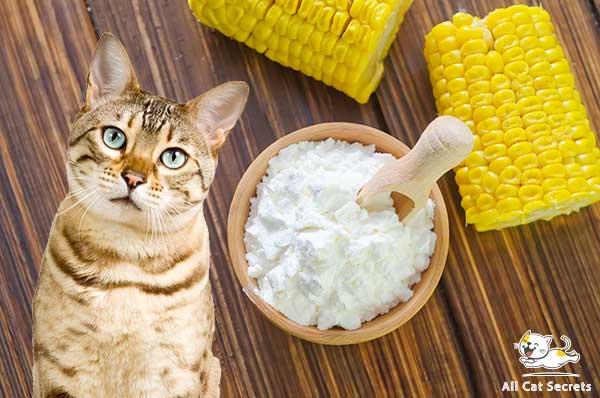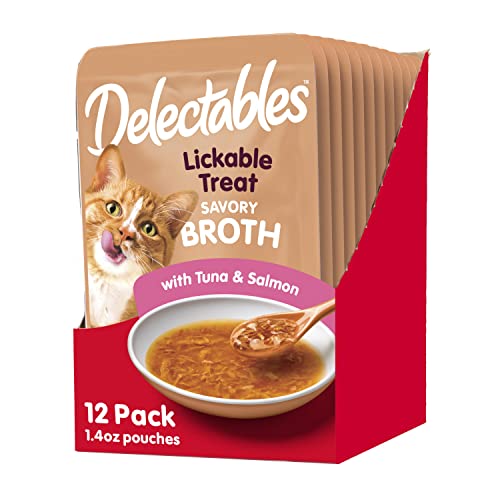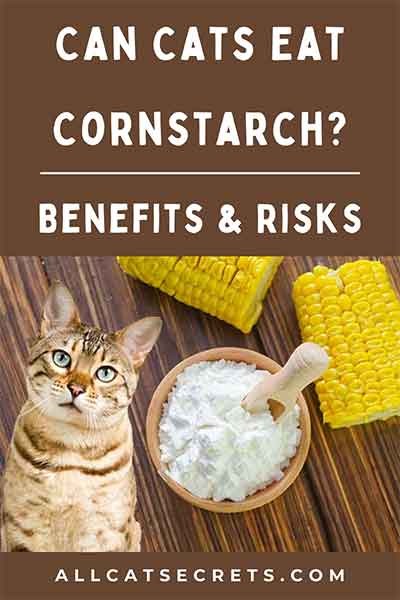Corn rarely appears among the common allergen sources in cats. That’s mainly because corn is starch. Therefore, it tends to be less allergenic than its flour form. But does that make cornstarch safe for cats? Can cats eat cornstarch?
Cats can definitely eat cornstarch. Pet nutritionists actually recommend pet foods formulated with cornstarch as a crucial carbohydrate source for cats suffering from corn allergy.
Besides, it’s worth noting that the apparent digestibility of starch in cats stands at 40 – 100%, depending on the source as well as the treatment processes the product has been subjected to.
In other words, cats are incredibly capable of digesting and absorbing carbohydrates. That makes cornstarch potentially safe and beneficial for your feline friend.
But as you might already know, cats are primarily obligate carnivores. Evolution did not prepare their stomachs for digesting plant-based foods. That’s especially if such foods are fed in excess. Therefore, the fact that cornstarch is inherently a plant-based product makes it potentially risky for cats and other carnivorous pets.
Read on as we unpack everything there is to know about cats and cornstarch.
Table of Contents
Is Cornstarch Safe for Cats to Eat?
The safety of foods for pets is primarily determined by the potential for such products to induce immediate toxicity. Based on this fact, it’s reassuring to know that cornstarch is perfectly safe for cats to eat.
That begs the question, can cats have cornstarch?
You can definitely add some cornstarch to your cat’s food. Your kitto is unlikely to drop dead after snacking on a meal infused with this product. Besides, cornstarch provides numerous health, dietary, and even skincare benefits for cats.
However, the crucial thing to note here is that cornstarch is a plant-derived food and your cat is an obligate carnivore. So, there will always be some potential risks and side effects to watch out for.
The risks of cornstarch for cats increase based on factors like age, portions served, and whether your feline friend is eating this food for the first time. More on this later on.
- Natural prebiotic fiber, sourced from chicory root, helps promote digestive health
- High protein formula with real chicken as the first ingredient
- Fortified with live probiotics to support digestive and immune health
Last update on 2024-07-12 / Affiliate links / Images from Amazon Product Advertising API
More About Cornstarch
As a loving cat owner who’s also irresistibly attracted to cornstarch, it’s not unusual to find yourself wondering, is cornstarch dangerous for cats?
We’ve already highlighted that cornstarch presents no immediate danger for cats provided that you serve it in moderation. We’ve also pointed out that pet nutritionists actually recommend this product for cats suffering from corn allergy.
But before we delve further into the benefits and potential side effects of using cornstarch in cat food, it would help to understand exactly what this food is all about.
Now, cornstarch goes by numerous other names, including cornflour and maize starch. It basically refers to the starch derived from corn/maize grain. The product comes from the endosperm of the maize kernel.
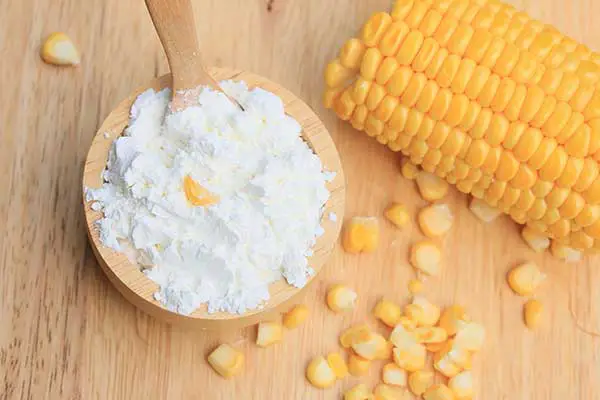
Cornstarch is a staple food ingredient in numerous cuisines worldwide. It’s mainly used to thicken soups, stews, sauces, and desserts. Maize starch may also be used to manufacture corn syrup and other sugar-based products.
As a food ingredient, cornstarch is noted for its incredible supply of carbohydrates.
Besides its application in the culinary sector, cornstarch may also serve as a raw material in various industrial processes. For instance, the substance is one of the chief raw materials in the manufacture of adhesives, anti-sticking goods, paper products, textile products.
Cornstarch also boasts many pharmacological applications. The product can help ramp up the supply of glucose for people battling glycogen storage disease.
Now that you’re well-acquainted with cornstarch, it’s now time to answer some pertinent questions regarding this food. For instance, is cornstarch harmful to cats and if so, what are the risks to watch out for? Read on as we continue to shine a light on the benefits and potential risks of cornstarch for cats.
Benefits of Cornstarch for Cats
One of the frequently asked questions regarding cornstarch and cats is, ‘is it ok if I add corn flour or cornstarch in my cat’s food?’
When it comes to choosing between cornstarch and corn flour for cats, you’re better off with the former.
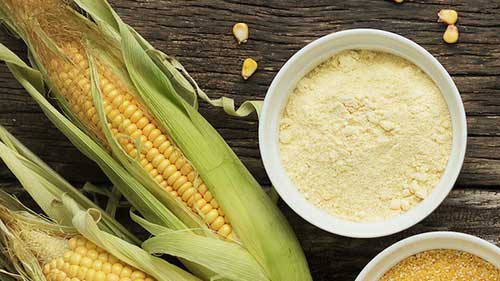
The biggest advantage of cornstarch over corn flour for cats is that cornstarch is less allergenic. Besides, there are numerous other benefits this product might provide to your feline companion.
A 100-gram serving of cornstarch contains the following nutritional elements;
- Calories: 381 kilocalories (1595 kilojoules)
- Carbohydrates: 91 grams
- Protein: 0.3 grams
- Fat: 0.1 grams
The same serving of cornstarch also contains minimal amounts of certain minerals, including copper, iron, selenium, and manganese.
Based on the above nutritional profile, it’s evident that cornstarch is remarkably high in carbohydrates.
Carbohydrate is energy-giving food. And while cats require minimal carbs in their diet, feeding cornstarch to your kitto might still help to increase the animal’s overall energy requirements.
Cornstarch is also low in fats. That makes it a welcome relief for pet parents looking to supplement their cat’s diet with a high-carb, low-fat food.
What’s more, cornstarch is recommended for cats suffering from corn allergy. That’s because the product seems less allergenic than other corn-derived goods, such as corn flour.
Besides its health and nutritional benefits, cornstarch may also help with flea management in cats. That begs the question – can I use cornstarch on my cat?
Indeed, one of the frequently asked questions regarding cats and cornstarch is, ‘is cornstarch safe for cat’s skin?’ And if yes, can you use cornstarch on cats’ fur?
Not only is cornstarch safe for a cat’s skin and fur. The substance can also help with flea management.
All you need to do is sprinkle some cornstarch over your cat’s fur and then brush the coat gently using a pet-grade brush. Start by brushing the animal’s coat against the grain. That helps in loosening any dirt, debris, and dead hair that might be attached to his fur.
You might also consider working the cat’s fur using your fingers to help pull the mat up from the skin so you can access the coat. Continue brushing your cat’s fur, pressing the brush gently against his coat. Finally, vacuum the cat’s coat. This will cause the fleas to die instantly once they get in the vacuum bag.
- KILLS FLEAS AT ALL LIFE STAGES: Breaks the flea life cycle by killing all stages of fleas: Eggs, Larvae, and Adults. This provides...
- FAST-ACTING FORMULA: A cut above other cat flea medicine, Adventure Plus is crafted to provide your beloved pet with immediate...
- SAME PROTECTION AS THE LEADING BRAND: Contains Imidacloprid and Pyriproxyfen, the active ingredients used in Advantage ii for Cats
Last update on 2024-07-12 / Affiliate links / Images from Amazon Product Advertising API
So, will cornstarch kill fleas on cats?
Flea management is one of the main reasons for using cornstarch on cats’ fur. While the product doesn’t attack fleas directly, it helps to demat a cat’s fur. That makes it easier to access the fleas with a vacuum.
To have better luck removing fleas, dirt, and debris from your cat’s fur, you might consider mixing equal amounts of cornstarch with baby powder. The baby powder mainly acts as a deodorant, leaving your cat’s fur with a pleasant aroma after the cornstarch treatment.
And you don’t need to worry about your cat licking his fur right after the treatment. That’s because both cornstarch and baby powder are non-toxic if ingested in small amounts.
It’s also worth noting that your cat might resist this flea treatment. When that happens, do not try to hold the cat down and forcefully apply the cornstarch on his fur. Doing so might frighten the cat, causing him to lash out at you. Instead, allow the animal to take a break and try administering the treatment some other day.
You can also make your cat feel relaxed during the treatment by petting him, grooming him, or speaking to him in a soothing voice. Don’t forget to reward the animal for good behavior.
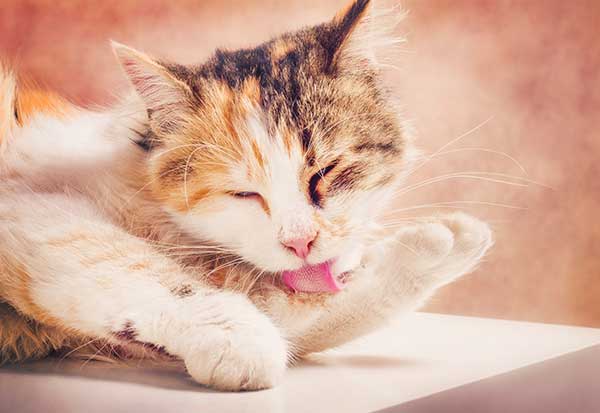
What if cornstarch for flea treatment doesn’t work?
There are various other natural ways to get rid of fleas from cats besides using cornstarch. For instance, you could apply a mixture of apple cider vinegar with water in the ratio of 2:1. Spray the mixture onto your cat’s coat regularly.
The fleas will be gone after a couple of treatments. This flea treatment option doesn’t necessarily require vacuuming. But you can always vacuum to eradicate these pesky parasites from your cat’s fur completely.
Possible Issues With Cornstarch for Cats
Cornstarch may be remarkably high in carbs and calories. But the food is exceedingly low in proteins, fiber, minerals, and vitamins.
Note that a cat’s diet should comprise primarily of proteins. Fiber also helps in aiding digestion and bowel movements. Therefore, the low levels of these essential nutrients makes cornstarch less attractive to cats.
Besides, cornstarch is inherently a plant-based product. We’ve already emphasized that cats are obligate carnivores.
Obligate carnivores can live exclusively on a diet of animal protein. While your cat can occasionally snack on plant-based foods like fruits and veggies, these compounds might trigger a host of gastrointestinal (GI) complications. That’s especially if fed in excess.
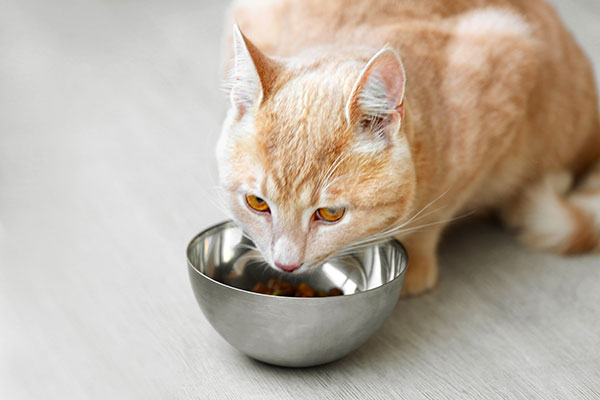
The following are common GI symptoms of cornstarch in cats;
- Nausea
- Loss of appetite
- Vomiting
- Excessive drooling
- Constipation
- Diarrhea
- Abdominal discomfort
Maybe you’ve always wondered, can cornstarch hurt cats? And if yes, will cornstarch hurt my cat if ingested?
Indeed, cornstarch may harm your kitto if consumed in excess. The side effects of cornstarch mainly present as symptoms of stomach upset.
It’s also worth noting that cornstarch can still induce allergic reactions in cats. Although the product is less allergenic than corn flour, the risks of allergy are still there.
Most cats that develop allergic reactions to cornstarch are usually those consuming this product for the first time.
That underscores the importance of going slow when feeding cornstarch or any other plant-based foods to your kitto for the first time. Start by giving the animal minimal amounts of the product. Then, observe him over a 24-hour-period for any adverse effects before deciding whether to increase or cut back on the portions.
- SmartBlend of high-quality ingredients in the digestive care cat food starts with real salmon along with accents of carrots and...
- High levels of protein in Purina ONE Tender Selects Blend adult dry cat food with salmon help support your cat's strong muscles,...
- Is Purina ONE good for cats? This natural dry cat food with added vitamins, minerals and nutrients and no artificial flavors or...
Last update on 2024-07-12 / Affiliate links / Images from Amazon Product Advertising API
The following are other potential downsides of feeding cornstarch to cats;
1. Cornstarch May Lead To Blood Sugar Spikes
Over 90% of cornstarch comprises carbohydrates. Carb-rich diets are known to have a high glycemic index.
Glycemic index is a measure of the extent to which certain foods impact blood sugar levels.
What complicates the situation further is that cornstarch is also low in fiber, the nutrient known to slow down the absorption of sugars from the stomach. So, feeding cornstarch to your kitto might cause spikes in blood sugar levels.
High blood sugar levels is a risk factor for chronic diseases like type 2 diabetes and obesity.
2. Cornstarch May Harm Your Cat’s Heart
Cornstarch is inherently a refined carb. Before the product is available in your local pet store, it must have undergone extensive processing. These processes introduce artificial chemicals in the substance while stripping it of its natural nutrients.
Studies have established a close relationship between refined carbs and heart disease. Diets high in refined carbs, such as cornstarch, may increase the risks of hypertension and coronary heart disease.
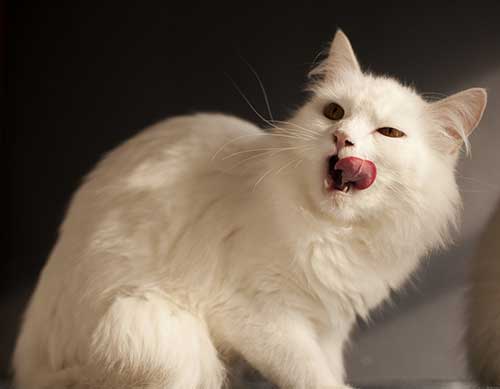
3. Cornstarch May Harbor Disease-causing Microorganisms
This is mainly a problem with raw cornstarch.
Like most raw foods, raw cornstarch could harbor harmful bacteria, such as Salmonella and E. coli. Therefore, it’s recommended to cook cornstarch before giving it to your cat.
The best way to prepare the food is by boiling or steaming it over moderate heat. Whichever cooking process you prefer, avoid adding salt, fat, or spices as these ingredients are potentially toxic for cats.
Besides harboring dangerous parasites, raw cornstarch might also cause gassiness or flatulence in cats. This can result in abdominal discomfort.
Is Cornstarch Bad for Cats?
We’ve already observed that cornstarch contains some health, nutritional, and even skincare benefits for cats. We’ve also gone over some potential adverse effects of cornstarch for cats. As to whether cornstarch is bad for cats or not depends on which side of the spectrum you’re looking at it from.
Perhaps the more pertinent question to settle here would be, ‘is cornstarch poisonous to cats?’
Cornstarch is generally safe for cats. The product doesn’t contain any known toxins.
However, the safety of cornstarch for cats mainly depends on the portions served. While small amounts of cornstarch will not be a problem for your kitto, huge quantities of this product could prove disastrous.
- 12 PACK: Each Delectables Savory Broths Lickable Treat pack includes twelve (12) 1.4-ounce pouches.
- NEW SENIOR 10+ SAVORY BROTHS: This new texture combines real tender chicken & tuna into a rich, savory broth with added Vitamin E...
- CATS LICK THE BOWL CLEAN: The chicken & fish and sauce are entangled in this tasty wet texture, ensuring your kitty eats the whole...
Last update on 2024-07-12 / Affiliate links / Images from Amazon Product Advertising API
Can a cat die from eating cornstarch?
Reports of cornstarch-related deaths are almost unheard of. But if the side effects of cornstarch aren’t managed in good time, then death might eventually occur.
Other Frequently Asked Questions Relating To Cornstarch and Cats
Can dogs eat corn flour?
The same rules of cornstarch for cats apply to dogs too. So, it goes that dogs can eat cornstarch in moderation.
It also goes that dogs shouldn’t eat corn flour. That’s because corn flour is more allergenic to pets than cornstarch.
Can kittens eat cornstarch?
Besides portions, age is another crucial factor to consider when serving cornstarch to cats.
Note that kittens tend to have more sensitive stomachs compared to adult cats. So, they’re more susceptible to the side effects of cornstarch.
You’re better off not sharing cornstarch with your kittens. That’s especially true for kittens that haven’t been weaned.
Can you put cornstarch on a cat wound?
There’s limited research suggesting cornstarch might have antiseptic properties. However, the fact that this product may be used in flea treatment also makes it potentially safe for using on a cat’s wound.
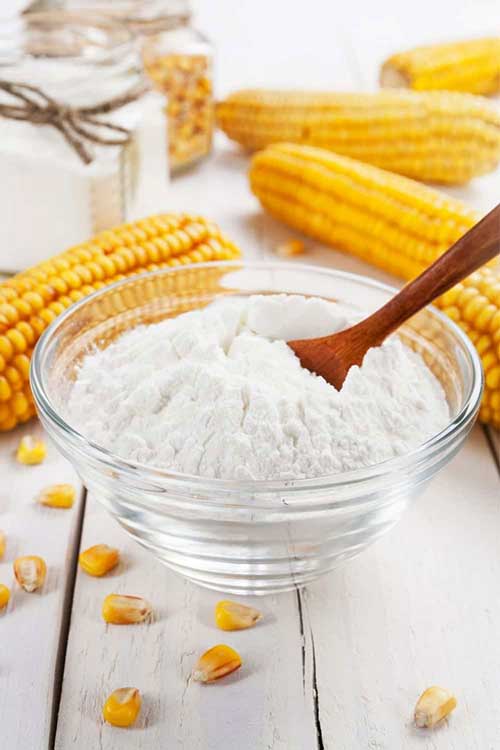
Conclusion
Cornstarch is safe and non-toxic to cats if consumed in moderation. However, the product contains minimal nutritional elements. The fact that cornstarch is also a plant-derived food makes it even less attractive for cats who should be obligate carnivores.
So, while you can feed cornstarch to your feline companion, you probably shouldn’t. If you’re looking to supplement your cat’s diet with plant-based products, you might consider alternative foods like rice, potato starch, or arrowroot.
Checkout Our Favorite Cat Products
1. Best Online Course For Cat Parents
Our favorite: The Cat Language Bible (How to Finally Understand And Speak to Your Cat) – A new form of cat to human communication that many cat owners have dreamed about… but few have actually thought possible.
2. Best Immune Support For Cats
Our favorite: Tomlyn Immune Support – Best Supplement for Cats and Kittens.
3. Best Cat Treats
Our favorites: LIFE ESSENTIALS All Natural Freeze Dried Chicken And Sheba Meaty Tender Sticks – Both are Great.

